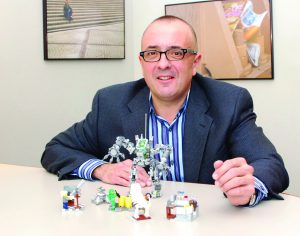
Marketing Professor Al Muñiz studies communities that form among people devoted to popular brands, including LEGO.
When DePaul Marketing Professor Al Muñiz completed his dissertation back in 1998, he didn’t foresee that his research would eventually change the way the marketing discipline and industry—and even other social sciences—thought about brands.
Muñiz’s dissertation was the basis of a Journal of Consumer Research article that introduced the concept of “brand community.” The term describes people who, united by their loyalty to a particular brand, feel a responsibility to share brand narratives and offer support and solutions associated with the brand. Examples include devotees to the Apple, Saab and Volkswagen brands.
“It was the first paper to acknowledge explicitly the social nature of certain consumer brands,” says Muñiz, who co-authored the article with University of Wisconsin Marketing Professor Thomas O’Guinn. “Prior to that, the field of consumer research viewed brands rather narrowly as summations of attitudes and conceived brands and their consumers as a simple consumer brand dyad. Our work called attention to the consumer-to-consumer relationships centered around the brand and showed that these relationships were just as important. It made the social aspect of brands explicit.”
Since its publication in 2001, the article has been referenced more than 3,000 times by other scholars, and Thomson Scientific named it as one of the most frequently cited articles in the business and economics disciplines in 2007. This past fall, the Association for Consumer Research recognized the lasting impact of this pioneering work by presenting Muñiz and O’Guinn with the prestigious Sheth Foundation/ Journal of Consumer Research Long-Term Contribution Award.
Muñiz continues to build on the work. He is currently researching the LEGO brand community, which has helped the toymaker develop new product ideas.
Beyond its contribution to business scholarship, Muniz’s research provides broader insight about human nature.
“A lot of cultural criticism has lamented the loss of community associated with modernity and the advancement of the marketplace,” Muñiz says. “Our work demonstrates that humans, as social beings, find and create community where they will. Sometimes, they will find it around a shared brand. Such a community form is a testament to the durability, resilience and centrality of community to human existence.
By Robin Florzak
